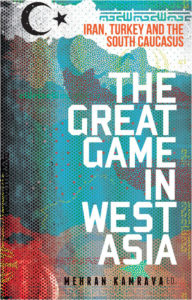
The Great Game in West Asia: Iran, Turkey and the South Caucasus
Edited by Mehran Kamrava
Hurst & Co. (2017), Rs4,097
The Great Game in West Asia examines the strategic competition between Iran and Turkey for power and influence in the South Caucasus. These neighbouring Middle East powers have vied for supremacy and influence throughout the region and especially in their immediate vicinity, while contending with ethnic heterogeneity both within their own territories and across their borders. Turkey has long conceived of itself as not just a bridge between Asia and Europe but in more substantive terms as a central player in regional and global affairs. If somewhat more modest in its public statements, Iran’s parallel ambitions for strategic centrality and influence have only been masked by its own inarticulate foreign policy agendas and the repeated missteps of its revolutionary leaders. But both have sought to deepen their regional influence and power, and in the South Caucasus each has achieved a modicum of success. In fact, as the contributions to this volume demonstrate, as much of the world’s attention has been diverted to conflicts and flashpoints near and far, a new great game has been unravelling between Iran and Turkey in the South Caucasus.
Mehran Kamrava has edited a set of illuminating and highly innovative essays on a topic that has received scant attention. The book brings together leading scholars who deliver an outstanding compendium that is likely to make a major imprint on the field – an important and necessary book.’ — Arshin Adib-Moghaddam, Chair of the Centre for Iranian Studies, School of Oriental and African Studies.
‘The South Caucasus may not view itself primarily as the stage for a great game between Iran and Turkey, but these two powers’ regional rivalry makes a useful lens through which to examine the diverse trajectories of Armenia, Azerbaijan and Georgia. Chapters by well-known academics from all sides have been fluently edited into a frank and inclusive overview of the region from several unusual vantage points.’ — Hugh Pope, International Crisis Group, author of Sons of the Conquerors: the Rise of the Turkic World.
Mehran Kamrava is Professor and Director of the Center for International and Regional Studies at Georgetown University’s School of Foreign Service in Qatar. He is the author of a number of books, including, most recently, The Modern Middle East: A Political History Since the First World War; Qatar: Small State, Big Politics; and Iran’s Intellectual Revolution.
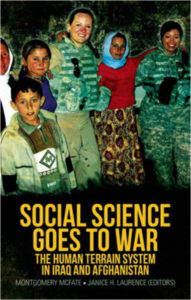
Social Science Goes to War: The Human Terrain System in Iraq and Afghanistan
Montgomery McFate (Editor), Janice H. Laurence (Editor), General David Petraeus (Foreword by) OUP (2015), Rs3,605
The Human Terrain System (HTS) was catapulted into existence in 2006 by the US military’s urgent need for knowledge of the human dimension of the battlespace in Iraq and Afghanistan. Its centrepiece was embedded groups of mixed military and civilian personnel, known as Human Terrain Teams (HTTs), whose mission was to conduct social science research and analysis and to advise military commanders about the local population. Bringing social science - and actual social scientists - to the wars in Iraq and Afghanistan was bold and challenging. Despite the controversy over HTS among scholars, there is little good, reliable source material written by those with experience of HTS or about the actual work carried out by teams in theatre. This volume goes beyond the anecdotes, snippets and blogs to provide a comprehensive, objective and detailed view of HTS. The contributors put the program in historical context, discuss the obstacles it faced, analyse its successes, and detail the work of the teams downrange. Most importantly, they capture some of the diverse lived experience of HTS scholars and practitioners drawn from an eclectic array of the social sciences.
“Social Science Goes to War is an extraordinarily important contribution to the literature on the recent US wars. McFate, a co-founder of the Human Terrain System, and the other authors, unflinchingly examine their efforts to help the US military understand the socio-political realities of Iraq and Afghanistan. The United States knew painfully little about the these places, a deficit that fatally compromised the prospects for US-led
ounterinsurgency. The same knowledge will be needed if the US wishes help build the peace.” — Linda Robinson, senior international policy analyst at the RAND Corporation and author of One Hundred Victories: Special Ops and the Future of American Warfare.
Montgomery McFate is a cultural anthropologist who works on defence and national security issues. She is the Minerva Chair at the Center for Naval Warfare Studies at the US Naval War College and has been profiled in the New Yorker, Elle and the Atlantic Monthly.
Janice H. Laurence is a professor in the College of Education at Temple University and is an internationally recognized military psychologist.
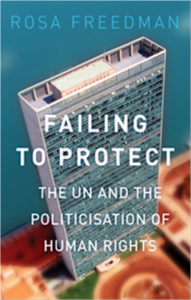
Failing to Protect: The UN and the Politicisation of Human Rights
Rosa Freedman
Hurst & Co. (2014), Rs2,784
The United Nations was established to safeguard world peace and security, development, and human rights, yet it is undeniable that it sometimes fails to protect the rights of a great many people. This book aims to look at the reasons for that failure. Rosa Freedman offers explanations of how and why the organisation is unable, at best, or unwilling, at worst, to protect human rights.
A stark, unpleasant, and disturbing picture. Yet Rosa Freedman, in Failing to Protect: The UN and the Politicisation of Human Rights, forces us consider whether the United Nations also ‘changes the channel’ when it is presented with accounts of systematic rights abuses. Freedman, a senior lecturer at the University of Birmingham, is the author of authoritative works on the UN Human Rights Council and is very well placed to guide readers through the UN’s complexities. Freedman uses this expertise to uncover the conspicuous contrasts between the calculating, paralysing politics of countries at the UN, and the horrific violations of human rights they discuss. This book shatters any illusion that the UN as it currently stands is a wholly benign agent for change.
Designed to be accessible to non-specialists, the book avoids the endless acronyms, committee names and document numbers that are often a feature of works in this area The aim of the text is to encourage the public-at-large to ‘start asking questions’ (p. xi), and it remains true to this aim by equipping readers with the information needed to engage in central debates. Freeman details the relevant sources of law, and gives user-friendly analogies with domestic legal situations to make the complexities of international law comprehensible. The book is rich with examples of past failures of the UN, and reflects the author’s clear understanding of the finest details of UN architecture. Freedman also analyses the UN human rights machinery, and key conceptual debates (such as those surrounding cultural relativism (ch. 5)), in a way that empowers the reader to form their own view and become involved in the reform projects.
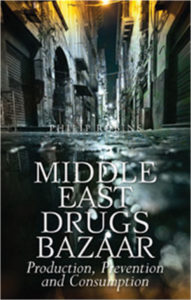
Middle East Drugs Bazaar: Production, Prevention and Consumption
Philip Robins
Hurst & Co. (2016)
Rs3,278
The Middle East is intimately involved in the issue of illegal drugs which affects all the countries of the region: as a cultivator (Morocco, Lebanon); transit hub (Iran, Turkey); and consumer (Egypt). Yet, until now, there has been precious little research on any of these issues, especially in a comparative manner. This book, the first in any language to focus on illicit drugs in the Middle East, will surprise many readers. The consumption of qat in Yemen or cultivation of cannabis in Lebanon’s Bekaa Valley is hardly news, but the extent of amphetamine use in Saudi Arabia and the Gulf States or the international role of Israeli narcotics manufactures and traffickers is less well known.
Based on extensive research and interaction with law enforcement agencies, the public and private health sectors, drug-centric NGOs, and recovering drug abusers, Middle East Drugs Bazaar focuses on ten of the leading countries of the region, straddling the Arab World, Israel, Iran and Turkey. It tells the story of drug-related experiences where they most impinge on the peoples and societies of the region.
In addition to the social role of illegal drugs, their political and economic impact are also covered, including: war and drugs in Iraq; drugs and development in Yemen; and youth policy and drugs in Saudi Arabia.
Philip Robins is Reader in Middle East Politics at St Antony’s College, University of Oxford. Prior to that he was the founding head of the Middle East Programme at Chatham House. He has worked on the region for more than thirty-five years.
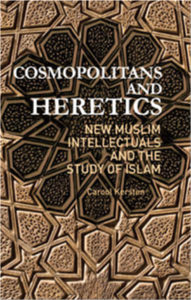
Cosmopolitans and Heretics: New Muslim Intellectuals and the Study of Islam
Carool Kersten
Hurst (2011)
Rs4,097
Dramatic political events involving Muslims across the world have put Islam under increased scrutiny. However, the focus of this attention is generally limited to the political realm and often even further confined by constrictive views of Islamism narrowed down to its most extremist exponents. Much less attention is paid to the parallel development of more liberal alternative Islamic discourses. The final decades of the twentieth century have also seen the emergence of a Muslim intelligentsia exploring new and creative ways of engaging with the Islamic heritage. Drawing on advances made in the Western human sciences and understanding Islam in comprehensive terms as a civilisation rather than restricting it to religion in a conventional sense, their ideas often cause controversy, even inviting accusations of heresy.
Cosmopolitans and Heretics examines three of these new Muslim intellectuals who combine a solid grounding in the Islamic tradition with an equally intimate familiarity with the latest achievements of Western scholarship in religion. This cosmopolitan attitude challenges existing stereotypes and makes these thinkers difficult to categorise. Underscoring the global dimensions of new Muslim intellectualism, Kersten analyses contributions to contemporary Islamic thought of the late Nurcholish Madjid, Indonesia’s most prominent public intellectual of recent decades; Hasan Hanafi, one of the leading philosophers in Egypt; and the influential French-Algerian historian of Islam Mohammed Arkoun. This is the first book of its kind and a welcome addition to the intellectual history of the modern Muslim world.
Carool Kersten is Senior Lecturer in the Study of Islam and the Muslim World at King’s College London. He is the author of Cosmopolitans and Heretics: New Muslim Intellectuals and the Study of Islam and co-editor of Demystifying the Caliphate, both published by Hurst.

